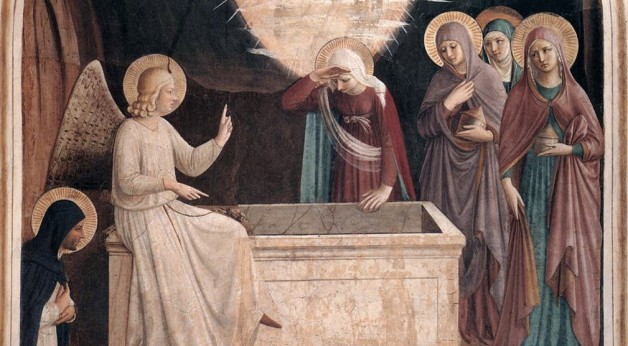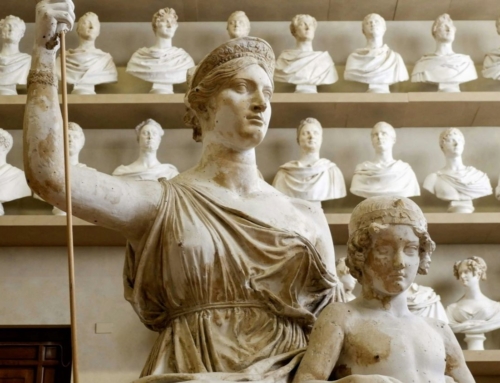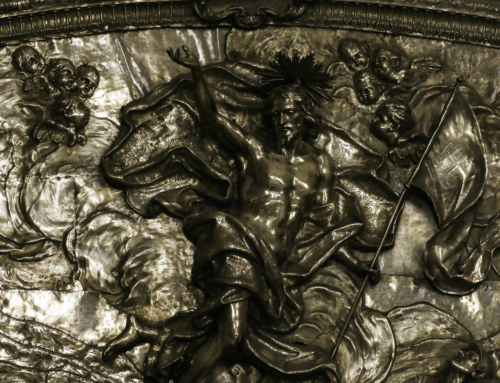Everyone knows that Easter is about the Resurrection: although at one time dead, Christ is now alive. Anyone who has lived in Western society at some point during the last two thousand years could probably affirm this. Most practicing Christians could go even further, saying with St. Paul that Christ’s resurrected life means life for us who believe in his name (see, for example, 2 Corinthians 5). Since the earliest days of Christianity, however, saints, mystics, and ordinary folk have struggled to internalize the meaning of this mystery. What does it mean to live not for ourselves, as St. Paul says, “but for him who died and was raised”?
St. John of the Cross, a mystic and doctor of the Church, tells us that, fundamentally, life in the light of the resurrection is about allowing the glory of God to fill and to satisfy us, both in our most lofty intellectual and spiritual desires, and in our daily emotional needs.
John of the Cross is not known for his spiritual practicality. For many, he seems to be occupied only with the rarified spiritual path reserved for the true mystic. Of course, Dominican theologians such as Reginald Garrigou-Lagrange have taken great care to show that, although most of us may not consider ourselves mystics, the spiritual path described by St. John is that same narrow way to which all Christians are called.
In The Living Flame of Love, St. John describes the spiritual path that leads to union with God. He speaks continually of a purgative period that can take place in the spiritual life, in which the senses, and the emotional and intellectual desires of the soul are gradually emptied, leaving the person in great aridity. St. John uses two metaphors to describe this emptiness: dryness and darkness. First, natural consolations and pleasures, and finally spiritual ones, are gradually taken away. St. John tells us that this darkness is almost like a cavern, or a hollowed space within ourselves. Those spaces in our emotional and spiritual experience, usually filled with the good things of the world and even the spiritual consolations of God, are left desolate, as if we had experienced a kind of spiritual death.
Resurrection is, by its nature, a passage from death to life. And we know that if we desire life with Christ, there is a sense in which we must first die. Life in the spirit requires death in the flesh. St. Paul tells us that to live in this way is to be recreated. Even our understanding of Christ must be purified of fleshly attachment:
From now on we regard no one according to the flesh; even if we once knew Christ according to the flesh, yet now we know him so no longer. So whoever is in Christ is a new creation: the old things have passed away; behold, new things have come” (2 Corinthians 5:14-15).
To live in Christ, then, is to be newly created. The “old things” pass away in the resurrection of Christ. Even those good things that previously satisfied us—or at least offered entertainment—are no longer sufficient. In comparison to the glory of Christ, all things pale.
St. John of the Cross says that in the spiritual life, these caverns of sense, feeling, and desire, which are hollowed out and darkened when the things of this world lose their taste, are not left in indefinite emptiness. These spaces, which once were filled with the experiences and fleeting goods of the world, are filled with the experience of the glory of God, as we are made a new creation in Christ. They are illuminated from within by a spiritual flame, such that the very shadows themselves burst forth in light. This flame is the flame of love—God’s life alive in the soul, which at once enkindles and consumes the soul and fills it like water, penetrating all aspects of the person; not only satisfying the intellect, but satisfying the emotions as well. Dryness is quenched, and darkness banished by the glory of the risen Christ.
Most of us will not experience in this life the height of mystical union that St. John describes, but the fruits of his experience in the spiritual way can help us to understand the sort of fulfillment that is offered to us in the resurrected Christ. There are many good and healthy desires in the order of nature: the joy of family, or the peace and emotional balance that comes with a life of natural virtue. But the supernatural gift of faith leads us down a path in which these natural goods eventually fail to satisfy. Once we have been given a taste for the things of God, only the Easter glory of the risen Lord can satisfy the desires of our soul. And God does not leave us wanting; he sates our thirst like water in a parched land, and he enkindles in us charity, the flame of which is his very life.
✠
Image: Fra Angelico, Women at the Tomb







